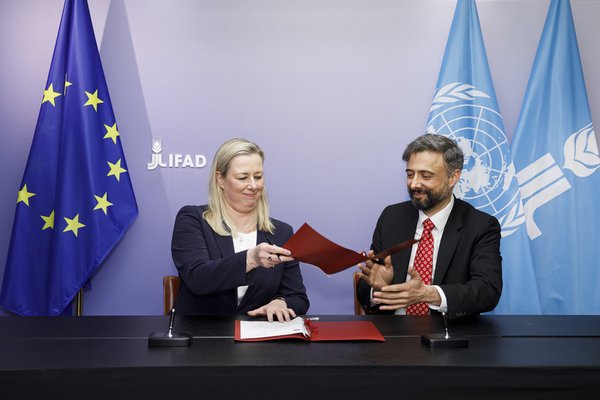 Read this article in French
Read this article in French- Share this article
- Subscribe to our newsletter
Strengthening sustainable food systems
Two agreements worth €70.7 million will boost the sustainable production of nutritious and locally grown food. They were signed by Jutta Urpilainen, European Commissioner for International Partnerships, and Alvaro Lario, President of the International Fund for Agricultural Development (IFAD), in March 2023. The agreements aim to build small-scale farmers’ resilience to climate and economic shocks in Africa, the Caribbean, and the Pacific.
The European Union is providing €52.5 million to IFAD as part of the Investing in Livelihood Resilience and Soil Health in ACP Countries programme. It will promote agroecology and sustainable agricultural practices. The aim is to improve and sustain soil fertility, use synthetic and organic fertilisers more efficiently, ensure soils make full use of nutrients through sustainable water management, produce local bio-fertilisers, use biodigesters, and increase small-scale producers’ access to inputs tailored to local agroecological conditions. Activities will be implemented in Ethiopia, Liberia, Malawi, Mali and Niger, with other countries potentially added over time.
The European Union is also providing a €18.2 million grant for the Global Programme for Small-scale Agroecology Producers and Sustainable Food Systems Transformation. Belgium is providing an additional €5 million. The programme will scale-up agroecology practices and help small-scale farmers gain better access to knowledge, support services, technologies and market outlets.
Agroecology provides solutions by helping small-scale farmers adapt to climate change, manage natural resources more efficiently, preserve biodiversity, and reverse land degradation trends. It also provides an alternative to synthetic fertilisers and increases production.
The number of people facing acute food insecurity soared from 135 million in 2019 to 345 million in 2022. Approximately 828 million people were estimated to be chronically undernourished in 2022 and almost 3.1 billion people could not afford a healthy diet.
(IFAD/ile)





Add a comment
Be the First to Comment